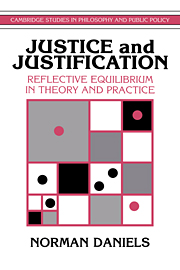Book contents
- Frontmatter
- Contents
- Preface
- 1 Introduction: Reflective equlibrium in theory and practice
- PART I
- 2 Wide reflective equilibrium and theory acceptance in ethics
- 3 Reflective equilibrium and Archimedean points
- 4 On some methods of ethics and linguistics
- 5 Two approaches to theory acceptance in ethics
- 6 An argument about the relativity of justice
- 7 Moral theory and the plasticity of persons
- 8 Reflective equilibrium and justice as political
- PART II
- Index
8 - Reflective equilibrium and justice as political
Published online by Cambridge University Press: 01 February 2010
- Frontmatter
- Contents
- Preface
- 1 Introduction: Reflective equlibrium in theory and practice
- PART I
- 2 Wide reflective equilibrium and theory acceptance in ethics
- 3 Reflective equilibrium and Archimedean points
- 4 On some methods of ethics and linguistics
- 5 Two approaches to theory acceptance in ethics
- 6 An argument about the relativity of justice
- 7 Moral theory and the plasticity of persons
- 8 Reflective equilibrium and justice as political
- PART II
- Index
Summary
POLITICIZING JUSTICE: PLURALISM AND STABILITY
In A Theory of Justice (hereafter Theory), Rawls argues that justice as fairness provides an Archimedean point from which to assess the justice of social institutions (Rawls 1971, 260–3). If a contractarian agreement on principles of cooperation were tied too closely to the actual interests and desires of persons, for example, if no veil of ignorance were present, then it would not provide such an Archimedean point. People are shaped by the institutions under which they live, and a contract reflecting their known interests would be mired too much in the effects of those institutions to provide critical leverage. Traditional alternative ways of anchoring that Archimedean point, such as a priori or perfectionist assumptions about the nature of persons and the social order, are also unattractive for several reasons. For one, such assumptions usually are too general to yield a useable contract. Alternatively, idealized contractors may seem so unreal to us that we cannot identify with them or their choices. Finally, the assumptions may be too narrowly held to provide a basis for common agreement. How, then, is that Archimedean point to be established?
If Rawls' Original Position had been based only on the weakest assumptions about human rationality - that is, if justice were derivable from rationality alone - then it would be clear how the Archimedean point was secured. The Original Position, however, rested on more robust assumptions: “reasonable” people had to agree it was an appropriate device for selecting principles of justice because the contract procedure was fair to all participants.
- Type
- Chapter
- Information
- Justice and JustificationReflective Equilibrium in Theory and Practice, pp. 144 - 176Publisher: Cambridge University PressPrint publication year: 1996
- 4
- Cited by

